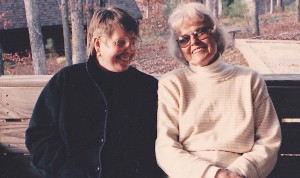According to the Population Reference Bureau, by 2050, the elderly population is estimated to be 16 % of the global population. That’s 1.5 billion of us, over the age of 65, tottering about, needing health care, doctors, nurses, and other caregivers to help us navigate our dotage.
When a first child is born, he or she does not come with an instruction booklet. Parents learn how to care for their new baby through advice from friends and relatives, and plain old experience. When the child’s parents start aging and ailing, the kid is in the same boat that the parents were in when they first arrived. Unless the parents die suddenly while they’re still young and capable, the kids become the ones in charge of of their parent’s latter years. There is no instruction manuel on how to care for the elderly.
Faced with what to do when my mother’s health started going down hill in 2000, I wanted to help make her last years more comfortable. . She lived near-by in her own home. Depending on traffic, it could take anywhere from twenty minutes to an hour to get to her in the event of an emergency. She had been having mini strokes, and the chances of her falling and doing major damage to herself was a worry.
When she’d first moved here to Virginia, a few years earlier, we visited a number of local senior citizen communities with both assisted living and nursing facilities. Mom and I were in agreement that she wasn’t yet ready for that and strongly believed that one should be around people of all ages until the very end of their lives. She was able-bodied, had her faculties about her, and said, “I don’t want to hang out with a bunch of old people.”
But when her health started failing a few years later, I had to make a decision about what to do. Our relationship wasn’t of the best quality. But I loved her and wanted to help her in some way. Friends told me to put her in an assisted living facility. They said, “She’ll be well taken care of and you won’t have a thing to worry about.” But on our earlier tour of those facilities, I wasn’t keen on what I saw happening there.
Having been the family caretaker and problem solver all of my life, I spent a number of difficult weeks trying to decide what to do, before I chose to bring her home to live with me. In my upcoming memoir, ME, MYSELF, AND MOM, A Journey Through Love, Hate, and Healing, I tell the story of the seven years I spent being Mom’s primary caregiver. It was a nightmare, as Mom, narcissistic and an alcoholic, was diagnosed with lung cancer and died a slow, painful death.
Would I do it again? To be honest, I don’t know. If I was the person I am today, I’d seriously think about it. But it’s downright terrifying for all parties involved, and is not for those with their own problems or challenging emotional ties with the person needing care. For me, it was a tempestuous, yet amazing personal growth experience, filled with heart wrenching despair. My own difficulties with an anxiety disorder and forgotten memories of childhood abuse, made those years living with Mom more than contentious.
At the time, robots were not part of the health care scheme. Right now, Japan, is experimenting with elder-care robots in nursing homes. The thought of being in a nursing home being fed by a machine that talks, is far beyond what I want when I can no longer take care of myself. Now going on seventy-two-years of age, I hope that by the time robots are on staff in every assisted living and nursing home, I will be a thing of the past. But what about those beyond my generation? Are robots capable of expressing compassion, love, and caring for those who need it as they die, often scared and in intense pain?
While finishing his Phd at the University of Salford in Manchester, England, Antonio Espingardeiro, developed a model robot, that could monitor aging patients, communicate with their doctors, and provide companionship and basic care. I get the monitoring and the communicating with doctors part, but can a robot provide a hug, and the knowing that you are loved and truly cared for?
I am making my wishes known right now, folks. Should they be ready before I move on, NO ROBOTS FOR ME! I want to be cared for by humans, even with all of their faults and difficulties. A metallic hand will never take the place of holding the hand of someone who understands our human condition. Only another human being is capable of that.

